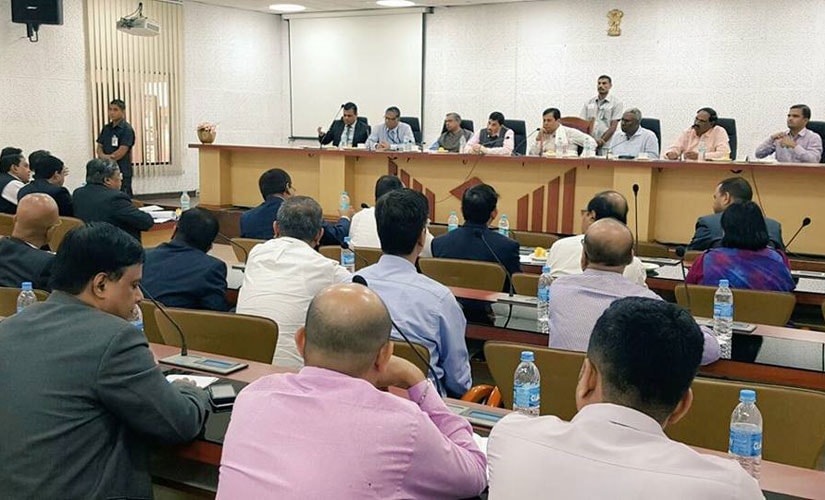“We have been facing difficulties because of this banning of notes. We got one round of wages, but it was delayed by three to four days. We have families and it becomes tough for us to run the house without timely wages,” Tarun Soreng, who is a worker at the Mahalaxmi Tea Estate in Assam’s Golaghat district told Firstpost. For someone like Soreng who earns Rs 1,380 as his fortnightly wage, the sudden financial upheaval to his life is understandable. The sudden demonetisation of Rs 500 and Rs 1,000 currency notes — leading to a shortage particularly of Rs 100 notes as a cascade effect — has indeed plunged lives into hardships for a large section of citizens. [caption id=“attachment_3122564” align=“alignleft” width=“380”]  A tea garden in Assam. AFP[/caption] Soreng’s colleague in the same garden, Bimoni Induwar is probably a little better off than him as she has a rough idea why the government took the step to “save money”. At the same pay scale as Soreng, Induwar shared the difficulties her family was facing but hoped that an ATM would help them more. “For people like us, a timely wage is very important. We now only want an ATM nearby. Although there was a delay, we were lucky that we got the money in Rs 20 notes. Otherwise, there is no change available,” she said. Dipu Nath, who is an office-bearer in the tea estate, was hopeful of timely wages in the next round. “We normally pay every fortnight but this time we had to pay on the next Wednesday instead of the Saturday. We are trying hard to pay on time in the next round,” Nath said. There are roughly 10 lakh tea garden workers in the state including both permanent and casual. Assam also contributed majorly with a production 652.95 million kilograms of tea in 2015-16 helping the country with a highest ever tea production during the fiscal year of 2015-16. This even led to the breaching of exports mark of 230 million kg after 35 years, as per a Tea Board of India report. Plucking the bud and two leaves — which also forms the soul of Bhupen Hazarika’s famous song Eti Kunhi Duti Paat as well — for the millions of cups of tea drank in India and abroad every day, workers like Tarun Soreng and Bimoni Induwar are the most vulnerable citizens of this country, who were probably among the worst hit in the demonetisation exercise. They hardly have any clue as to what is happening other than that it is happening for good which has kept them and the rest from their community working in tea gardens patient, so far. The tea industry in Assam still follows the British regimen of running the gardens with the wage based on cash and kind either on a weekly or fortnightly basis depending on the choice of individual gardens or companies owning them. The wages are usually paid in cash and normally on Fridays and the lightning demonetisation on 8 November, which was a Tuesday, was no less than a shocker for the management and workers alike. “There was no major problem. The government of Assam under Chief Minister Sarbananda Sonowal was proactive and helped us tide over the situation. We got the money in 24 hours. The gardens are slowly returning to normalcy and the chief minister is keeping a tab on the situation by constantly being in touch with the officials,” Assam Branch of Indian Tea Association (ABITA), secretary, Sandip Ghosh told Firstpost from Guwahati. The words of the ABITA secretary sounded hopeful and “no major problem” could easily be decoded as there is no instance of violence so far in these times of uncertainty. Apart from the timely disbursal of wages which has become an issue in some gardens, he admitted that gardens are facing a dearth of currencies in smaller denominations. “There is a shortage of currencies in smaller denominations. Larger notes are available now. The payment process has to be streamlined and we are working on it,” he said. Assam has a total of 792 tea gardens, out of which 685 falls in the Brahmaputra valley and the remaining 107 are located in the Barak Valley. Out of the total tea gardens, 277 are members of ABITA. What worried the tea management in the gardens more was not the ban on the Rs 500 and Rs 1,000 currency notes, but the restrictions on withdrawing money beyond a certain limit. “The cash withdrawal notification imposing restrictions on the amount is a problem for us. Tea gardens across the state taken collectively need Rs 50 crore on an average to pay wages on a weekly basis. The average math comes down to around Rs 10 lakh per garden on a weekly basis which may vary depending on the size and employee strength of the garden,” said Tea Board of India vice-chairman and advisor, North Eastern Tea Association (NETA), Bidyananda Borkakoty.
Bharat Ka Rajpatra 02 by Firstpost on Scribd
“Some gardens opt to pay the wages on a fortnightly basis as well. The wage is a two part component comprising of cash and kind which includes ration. The limit on withdrawal, which was earlier Rs 20,000 a week and now raised to Rs 50,000, was an immediate concern. Only the government could withdraw beyond the stipulated limit,” he said. In view of the unprecedented crisis to which the state’s tea sector was fast going, urgent consultations were held among the stakeholders — the tea garden owners/management, the government and the banks — and what came out was an innovative way to follow all the RBI guidelines on withdrawals but yet to keep the wages coming. This is now what is being portrayed everywhere in the country as the Assam model. Traditionally, wages have remained a sensitive issue in tea gardens and there are numerous instances where disputes and delays in wages have even led to brutal killings. To prevent the situation from snowballing into a major law and order situation across the state, it was abundantly clear from past experiences that the cash flow should not stop. “When we approached the government, Sonowal intervened into the matter and a method was devised to release salary to tea garden workers through the deputy commissioners of each tea-producing district. Accordingly, all deputy commissioners opened an account in the State Bank of India and the tea garden management would transfer the amount needed for wages through RTGS (real-time gross settlement) to that account. After the deputy commissioner is satisfied with the reason for withdrawal, the amount is returned to the management in cash for disbursal of wages,” Borkakoty said. Although the promptness from all quarters salvaged the situation for the state’s tea sector, the unavailability of physical banking services within commutable distance was glaring. “Although we are helping every worker to open bank accounts, banking facilities provided to the workers are not sufficient. So many of them have bank accounts already but they could not use them. Either the nearest ATM was 12 kilometres away or the branch was 20 kilometres away. It does not make economic sense for the banks to set up branches in these remote areas from which most of the tea gardens operate. But then due to this physical distance what the country is missing out most is the financial inclusion of this category of people,” said Aideobari Tea Estates (P) Ltd, director and member of the Assam Tea Planters Association (ATPA), Raj Barooah. “The banks will have to come closer to the people in rural India. Until we have something like a mini bank for the workers, the scenario is not conducive for the workers to avail banking facilities. It has to be near workplace or the residence. The banks need to be more proactive. A new mechanism is needed for the remote corners of the state,” he said. [caption id=“attachment_3122590” align=“alignnone” width=“825”]
 Assam Chief Minister Sarbananda Sonowal in a meeting with all the banks, tea garden associations and Assam Chah Mazdoor Sangha to discus the wage disbursal issue in the state’s tea sector. Image courtesy Sonowal’s Facebook page[/caption] On 21 November, in a meeting held by Sonowal with all banks, various tea garden associations and Assam Chah Mazdoor Sangha it was decided to open Jan Dhan accounts for tea labourers who do not have bank accounts, by 5 December. The meeting also unanimously agreed “to prepare a roadmap for disbursal of wages of the tea labourers through their bank accounts.”


)
)
)
)
)
)
)
)
)



